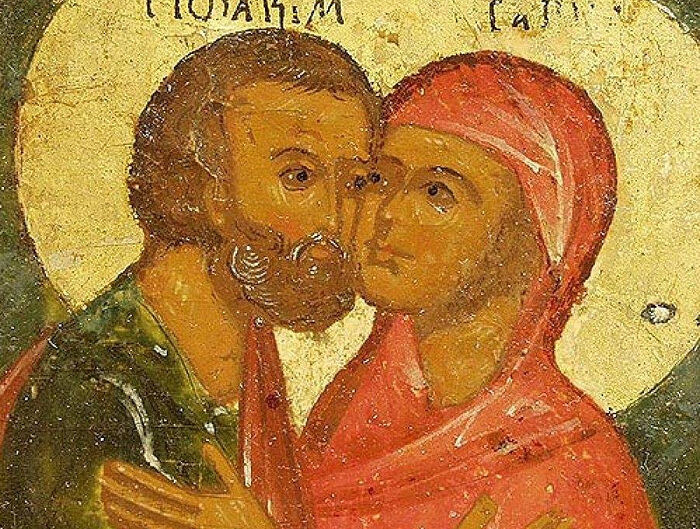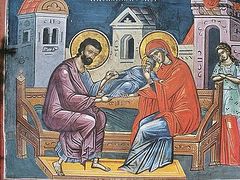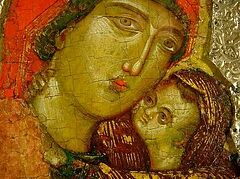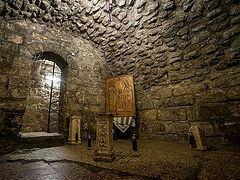In the services for the Nativity of the Theotokos, the Synaxis of Sts. Joachim and Anna celebrated the next day, and on the feast of the Conception of the Theotokos by St. Anna on December 9/22, the holy and Righteous Ancestors of God Joachim and Anna are continually praised for their pure and chaste manner of living.
For example, on the Synaxis of Sts. Joachim and Anna on September 9/22, we read:
Possessed of a most exalted life and splendor of life, together ye surpassed all the parents of earth, giving birth to the incorrupt Virgin, and truly becoming ancestors of God because of her (Matins Canon, Ode 1).
The most lauded Anna and Joachim, the two honored chaste ones, the divinely wise couple, have given birth to the divinely adorned throne of the Virgin, who hath been elevated above all by the hand of God (Ode 5).
So, we can ask what characterized this “most exalted life;” what made them “two honored chaste ones?” After all, a chaste marriage is the ideal for all true believers, and surely Sts. Joachim and Anna are not the only ones who have attained to it.
St. Paisios the Athonite, the great twentieth-century elder, venerated and beloved throughout the Orthodox Church, gives us Divine insight into this question.
In the book Elder Paisios of Mt. Athos, Hieromonk Isaac, one of the Elder’s closest disciples, recounts:
Once, on Sinai, the Elder beheld a supranatural event in the Holy Spirit: the holy and temperate marital relations of the Ancestors of God, Joachim and Anna, by which the Holy Theotokos was conceived and born. The Elder related to us the revelation he received: “Saints Joachim and Anna were completely spiritual people, without any carnal-mindedness at all. They were the most passionless couple that’s ever lived. First, they prayed to God separately, with tears, that He would give them a child, and then they came together, out of obedience to God and not out of any carnal desire. And, since the conception happened without self-indulgent pleasure, the Panagia was all-pure and chaste. Of course, she wasn’t free from ancestral sin, like the papists falsely believe, because she was conceived in the usual or natural way [that is, not without seed, like Christ]; but still [it was] totally without passion, as God wanted people to be born.”
And for those who may doubt this revelation, the story continues:
Once the Elder was stressing these truths during a discussion. Seeing that the other person was hesitant and reluctant to accept his words, he stood up and in a decisive tone declared, “I experienced what took place!” He wanted to make clear that he was expressing, not the content of his own reverent thoughts, but a divine revelation.1
So we see that God revealed to St. Paisios that not only were Sts. Joachim and Anna chaste, but they were the most chaste, and indeed their holy lives led them to a state of passionlessness, such that they were able to come together solely for the sake of a child and not to satisfy the pleasure of the flesh.
But why is this laudable? After all, sexual reproduction is a law of nature, and the marriage bed is pure and undefiled, as the Apostle Paul tells us (Heb. 13:4).
The important context here is that sexual reproduction is the law of fallen nature. It is the universal teaching of the saints of the Church that in Eden, before the Fall, virginity reigned. Marriage as we know it and sexual reproduction were given to man in response to the Fall that brought corruption and death into the world.
To cite but one Father, St. John Chrysostom states:
“Now Adam knew Eve his wife.” Consider when this happened. After the disobedience, after their loss in the Garden, then it was that the practice of intercourse had its beginning. You see, before their disobedience they followed a life like that of the angels, and there was no mention of intercourse. How could there be, when they were not subject to the needs of the body?2
And again:
Why did marriage not appear before the disobedience? Why was there no intercourse in Paradise? Why not the pains of childbirth before the curse? Because at that time these things were superfluous. The necessity arose later because of our weakness, as did cities, arts and skills, the wearing of clothes, and all our other numerous needs.3
St. John’s statements that there was neither intercourse nor the pains of childbirth before the Fall lead us to the works of St. Maximus the Confessor, who is perhaps most associated with the Patristic teaching on pleasure and pain.
As St. Maximus teaches:
When God the Logos created human nature He did not make the senses susceptible either to pleasure or to pain; instead, He implanted in it a certain noetic capacity through which men could enjoy Him in an inexpressible way. By this capacity I mean the intellect’s natural longing for God.4
However, Adam and Eve beheld the Tree of the Knowledge of Good and Evil and the forbidden fruit and saw that it was pleasing to behold, and so they “transferred this longing to the senses, and through them began to experience pleasure in a way which is contrary to nature.”5
It is because of this turn towards sensible pleasure that pain becomes our constant companion:
Because of the meaningless pleasure which invaded human nature, a purposive pain, in the form of multiple sufferings, also gained entrance. It is in and from these sufferings that death takes its origin.6
Applied to reproduction, we see that it is because children are conceived in pleasure that they live a life full of pain that ends in the grave (it is also why childbirth itself is painful):
After the fall, the generation of every man was by nature impassioned and preceded by pleasure. From this rule no one was exempt. On the contrary, as if discharging a natural debt, all underwent sufferings and the death that comes from them.7
Put another way, because man is conceived according to the fallen mode of reproduction, He receives the fallen mode of nature, susceptible to suffering, corruption, and death.
Thus, we see that the sensible pleasure of sexual reproduction is not part of God’s original design. Man was already called to multiply before the Fall, but we cannot say how it would have occurred, as teaches St. Maximus:
The distinguishing qualities of male and female were not at all contingent on the divine intention concerning man’s generation. Foreknown to God was yet another way of increasing mankind into a multitude.8
The incomparable St. John of Damascus teaches the same:
Increase and multiply does not mean increasing by the marriage union exclusively, because if they had kept the commandment unbroken forever, God could have increased the race by some other means.9
And so, returning to Sts. Joachim and Anna, we see that they are praised so highly precisely because in their holiness of life and chastity, they drew near to the life of Paradise, able to offer to God as dispassionate a conception as possible.
Sts. Joachim and Anna conceived solely for the sake of fulfilling God’s command to multiply, giving no room to the passionate relations that characterize marriage and reproduction after the Fall; and as was Divinely revealed to St. Paisios, they therefore gave birth to the Most Pure, Most Holy Theotokos. The state of their souls at the time of conception could not but have a positive impact on their child.
However, despite attaining to the heights of passionlessness, Sts. Joachim and Anna were powerless to overcome the fallen mode of reproduction, and thus the Theotokos inherited the fallen mode of nature.
Only God Himself was able to overcome this law, and thus it was for Christ in His Virgin Birth, His conception by the Holy Spirit, to eradicate the pleasure-pain dialectic that had reigned for so long. Thus, Christ was, in fact, born with the pre-fallen mode of human nature. Christ alone does not inherit ancestral sin.
Because the Most Holy Theotokos conceived without pleasure, she brought forth Child without pain. And because He was conceived without pleasure, Christ’s death on the Cross was undeserved. And further, because He lived sinlessly, His death was unjust. St. Maximus teaches as much:
Another kind of suffering and death had to be conceived, first to destroy the ill-gotten pleasure and the justly deserved sufferings consequent on it—sufferings which have pitiably brought about man’s disintegration, since his life originates in the corruption that comes from his generation through pleasure and ends in the corruption that comes through death; and, second, to restore suffering human nature. This other kind of suffering and death was both unjust and undeserved: undeserved because it was in no way generated by preceding pleasure, and unjust because it was not the consequence of any passion-dominated life.10
The Theotokos is the only woman to have fulfilled the Paradisiacal command to be fruitful and multiply, for she alone is both Virgin and Mother.
And in her own parents, the holy and righteous and all-chaste Sts. Joachim and Anna, we see what heights can be attained through pure devotion to God, and from them we can take inspiration for how to properly conduct our own married lives.





